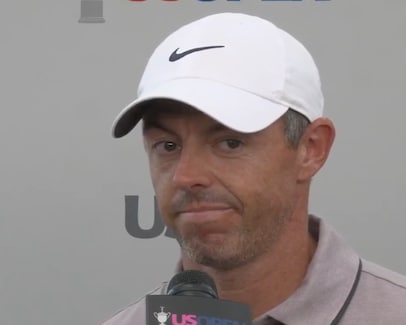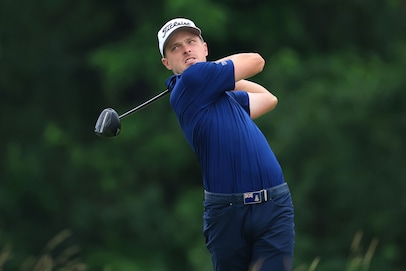OAKMONT, Pa. — Robby Oakes could tell something had shifted in his protégé. The kid had attacked his first several months at Oakes’ mortgage firm with intensity and proved himself a wizard with spreadsheets. But after returning from a recent trip, Griffin seemed detached. While such restlessness wasn’t unusual for a 20-something finding his footing, this felt different. The laser-focus was gone as were the constant questions and the eagerness to get ahead. So when a visibly nervous Ben Griffin asked if they could grab breakfast at Sutton’s Drug Store—a humble burger joint in Chapel Hill—Oakes sensed what was coming.
And frankly, he was all for it.
“I believe my reaction was, ‘Awesome,’” says Oakes on the phone Saturday afternoon. “I mean, you’re in your young 20s, and you’ve got a chance to go for your dream again. We will also be here, but golf may not be, so you have to do it.”
Griffin, 29, is enjoying a breakout campaign in his third year on the PGA Tour. Griffin has captured two victories this season at the Zurich Classic and Charles Schwab Challenge and nearly claimed a third with his runner-up finish at Memorial. Only Scottie Scheffler has more top-10 finishes on tour in 2025. Griffin’s scorching form has made him a viable candidate for the U.S. Ryder Cup team this fall and carried him into Saturday’s third round of the U.S. Open just three shots off the lead at Oakmont.
Week-to-week fans know Griffin’s compelling backstory by heart: burned out after years of grinding on mini-tours, he hung up his clubs for a mortgage-loan officer’s desk—until the competitive fire reignited, prompting one final pursuit of his pro golf dreams. It’s the kind of redemptive arc that makes for great television and even better marketing copy.
But here’s the problem with feel-good sports narratives: the truth often gets stretched in the retelling. There is such an appetite for blue-collar backgrounds that minor details can get amplified by agents, media or the players themselves to craft a more compelling myth. A kernel of authentic struggle transforms into something barely recognizable, polished until it gleams with Hollywood perfection.

Griffin teamed with good friend Andrew Novak to win the Zurich Classic of New Orleans in April.
Jonathan Bachman
So as Griffin chases his first major championship at one of golf’s cathedrals, we decided to bypass the usual sources and go straight to his former employer. The goal wasn’t to debunk Griffin the golfer, but to understand Griffin the mortgage professional—to separate the man from the marketing.
The verdict? In this case, the legend actually lives up to the hype.
“I just told somebody that if you wanted to put your logo on someone, he is the kid to do it,” Oakes says. “He’s just conscientious, attentive, a great employee. Just a great kid.”
Oakes arrived at Corporate Investors Mortgage Group in 2003 and built a reputation as one of the industry’s top performers, eventually become managing director. Over two decades, he has financed more than $3 billion in home loans and earned recognition from Mortgage Executive Magazine and National Mortgage News as one of the nation’s top 25 loan officers. His connection to the Griffin family runs deep—he’s worked alongside Ben’s mother, Erika, a senior mortgage banker at CIMG, for years and watched Ben grow up around the office.
Griffin was a standout high school golfer who chose to stay close to home, enrolling at the University of North Carolina. His amateur career flourished in Chapel Hill, where he captured three tournament victories and earned All-American honors twice before turning professional in 2018. The transition to the pro ranks, however, proved brutal. Griffin bounced between the Canadian Tour, PGA Tour Latinoamérica and Korn Ferry Tour, accumulating little beyond mounting expenses and dwindling confidence. By 2021, the financial strain had become suffocating and Griffin’s passion for the game had withered. Faced with the reality that golf might not be his calling, he swallowed his pride and reached out to Oakes. The conversation was simple: He needed work.
“He came to me and said, ‘I really want to learn from you,’” Oakes says. “It was a really busy time, and frankly we needed extra help, so it was nice to have him on board.”
More Golf Digest U.S. Open coverage  U.S. Open Rory McIlroy opens up about why he’s skipped media after third-round 74 at Oakmont
U.S. Open Rory McIlroy opens up about why he’s skipped media after third-round 74 at Oakmont  Amateurs Call it a pro golf apprenticeship. The kid from the Cayman Islands is loving every minute of it
Amateurs Call it a pro golf apprenticeship. The kid from the Cayman Islands is loving every minute of it  U.S. Open Shane Lowry’s rules violation was so absurd that he and Rory McIlroy could only laugh about it
U.S. Open Shane Lowry’s rules violation was so absurd that he and Rory McIlroy could only laugh about it
Griffin didn’t just prove his worth—he exceeded every expectation. He volunteered for the grunt stuff veteran officers avoided and displayed an ability to wrangle complex financial data into crystal-clear insights. Within weeks, Oakes realized he had discovered a natural-born analyst who could spot inconsistencies in credit reports that seasoned professionals missed.
“He was a huge help with our analytics,” Oakes says. It was right before AI, during a time when the company was trying to find the most efficient ways to use its past customer database in a search for anyone who needed to refinance since it was during the peak of low rates. “Ben was exceptional at looking at his spreadsheets and organizing them for us in a way no one else could.”
Griffin didn’t talk about golf much, Oakes said. He put the clubs away, wanting to put that part of his life in the past. The only time it came up was during a company outing at Topgolf. “We were hosting clients, realtor partners and referral partners. And we basically just sat there and watched Ben in awe at the range,” Oakes says. “He was hitting ball after ball in a way no one else could, and everyone was looking thinking, ‘Who is this?’”
Griffin was settling into his new life, and Oakes believed the young man had discovered a career that could be his. Then summer arrived, and with it came an invitation that would change everything.
An old friend asked Griffin to play in a member-guest tournament in Missouri—just for fun, nothing serious. Griffin hadn’t touched a club in months. Yet something magical happened on that course: he shot a 63 on his own ball, the kind of round that reminded him why he had fallen in love with golf in the first place. The timing felt like serendipity. The same course was hosting a Korn Ferry Tour qualifier just weeks later, and Griffin’s friend offered to fly him back out. Suddenly, the competitive fire that had been smoldering in Griffin’s chest roared back to life. He knew the feeling was real when he found himself unconsciously driving to his local course one morning instead of the office, muscle memory overriding rational thought.
When Griffin returned to Missouri for the qualifier, he backed up that member-guest magic with a 65, earning his spot in the tournament field. A group of friends quickly rallied around him, pooling their money and offering to bankroll another shot at professional golf. But Griffin faced a dilemma. Oakes had taken a genuine risk on him when he was desperate and walking away now felt like betrayal. He needed his mentor’s blessing before he could chase his dreams again.
“I think he was shocked by the reaction being so immediate,” Oakes says. “Just shows you why type of person he is, wanting to do things the right way.”
Over the last four years, those dreams have come true. Griffin is unquestionably one of the best in the sport over the last half year, and everyone may know it by the end of this weekend. Oakes knows Griffin’s world is changing, so he tries to leave him alone, although he did text him after Colonial. “I just wanted to let him know we were all so proud of him,” Oakes says. “For what he was doing, for trying to chase the dream again, but for also being a good person.”
This weekend, Oakes will be planted on his couch in North Carolina, cheering for his former protégé. But before ending our conversation, the veteran loan officer can’t resist making one final request—one that harks back to that pivotal breakfast conversation at Sutton’s Drug Store, of a man collecting on an old debt.
“Ben did promise me Masters badges if he ever made it,” Oakes says. “Maybe you can remind him of that for me.”
MORE GOLF DIGEST U.S. OPEN COVERAGE
U.S. Open 101: Answering all your frequently asked questions
How to watch the 2025 U.S. Open
Here’s the record prize money payout at the U.S. Open
If this was Phil Mickelson’s last U.S. Open, it ends with more heartbreak
11 surprising players who missed the cut at Oakmont
Shane Lowry can only laugh after crazy rules blunder
Watch aspiring tour pro make putt to make the cut, let all the emotions out
Mythbusters: How much distance do you lose from thick rough?
The secret everybody misses about U.S. Open carnage
The local rule that could cause some chaos at Oakmont
The top 15 U.S. Opens, ranked
The 18-hole hazard: The U.S. Open rough is impossible and simple
This article was originally published on golfdigest.com




